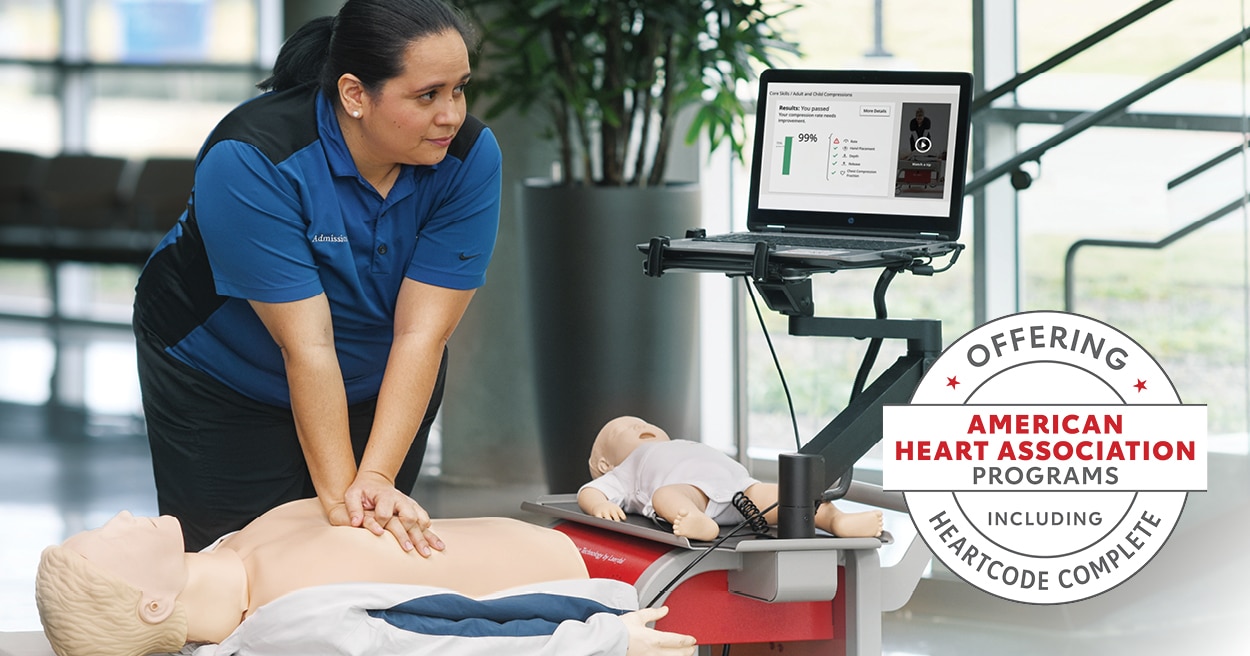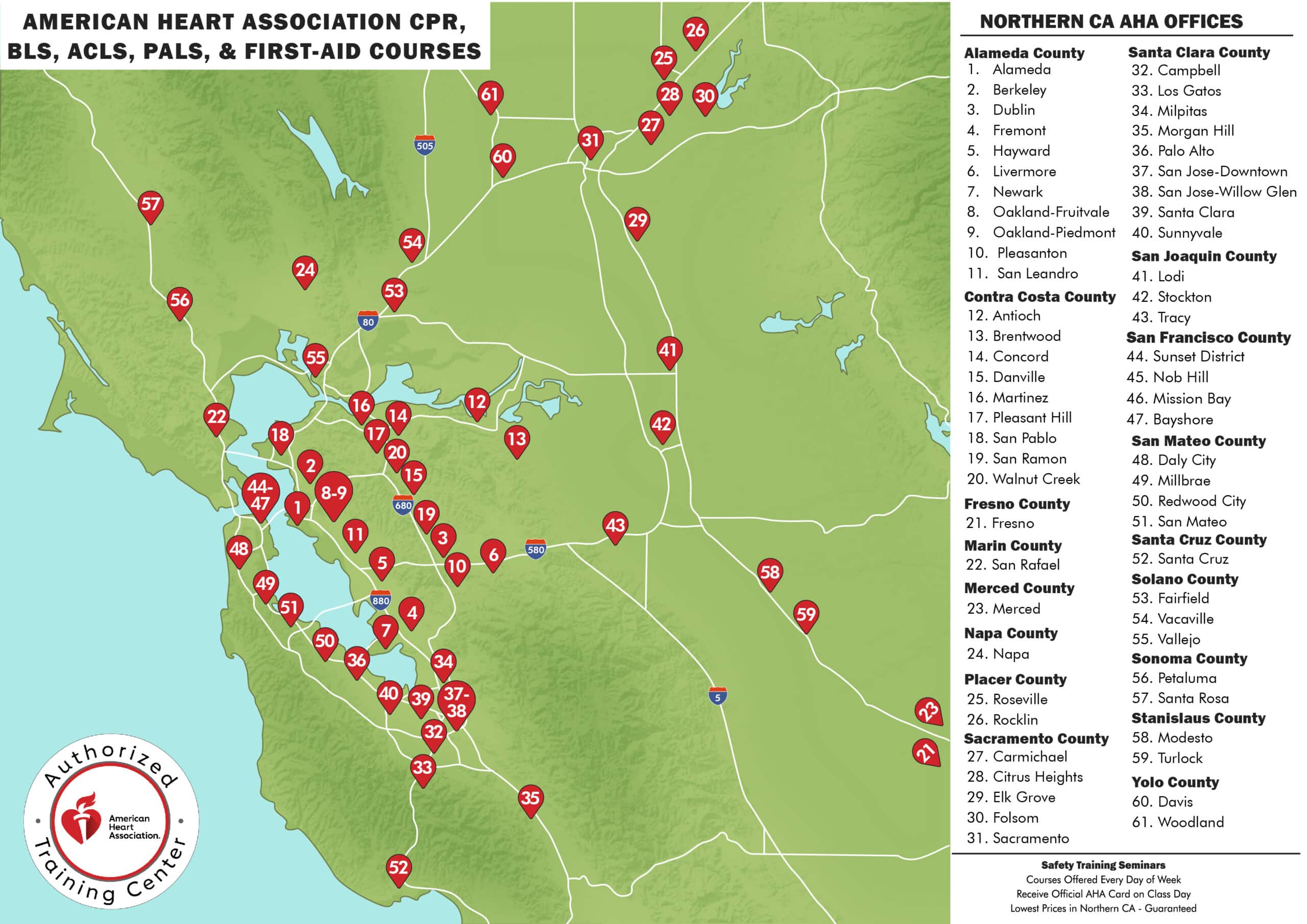American Heart Association© BLS CPR Certification Classes in Redwood City

American Heart Association© BLS
Course Name: BLS CPR Provider Heartcode (Initial or Renewal)
Online Course Length: 1-2 hours (At your home.)
Skills Testing: 40-60 minutes (At one of our over 60 CPR testing sites.)
Description: CPR (adult, children, & infant), 2 person CPR, AED, bag valve mask
Price: $120 (This includes the online BLS course, skills testing, and card.)
Certification: American Heart Association© BLS certification card.
When: BLS classes are offered Monday – Sunday from 7 am to 6 pm
Card Issuance: You will receive the card on day of class.
Add ons available: ACLS, PALS, First-aid, Opioid, or Bloodborne Pathogens
Low Price Guarantee: Lowest prices in Northern CA. Price matching policy.
View Upcoming BLS Courses in Redwood City
View BLS Courses in Redwood City & Other Cities Near You

Empowering the Community: American Heart Association BLS CPR Classes in Redwood City
In moments of crisis, the ability to respond effectively can mean the difference between life and death. Basic Life Support (BLS) CPR classes offered by the American Heart Association (AHA) in Redwood City, California, provide individuals with the knowledge and skills necessary to act decisively in emergencies. This article explores the significance of BLS CPR training, the offerings of the American Heart Association in Redwood City, and the impact these classes have on the community’s safety and well-being.
The Importance of BLS CPR Training
Cardiac arrest is a leading cause of death globally, with the majority of cases occurring outside of healthcare settings. BLS CPR training equips individuals with the skills to recognize cardiac emergencies, initiate CPR, and use automated external defibrillators (AEDs) effectively. By learning these life-saving techniques, participants become empowered to intervene in critical situations and potentially save lives.
BLS CPR training focuses on high-quality chest compressions, proper ventilation techniques, and the importance of early defibrillation. Participants also learn how to recognize signs of choking and respond appropriately. These skills are invaluable in a variety of settings, including homes, workplaces, and public spaces, where immediate action can make a significant difference in outcomes.
The American Heart Association’s Commitment to Community Health
As a globally recognized leader in cardiovascular research, education, and advocacy, the American Heart Association is dedicated to improving cardiovascular health and reducing deaths from heart disease and stroke. In Redwood City, the AHA collaborates with local healthcare providers, educational institutions, and community organizations to offer BLS CPR classes that are accessible and impactful.
Certified AHA instructors facilitate BLS CPR classes in Redwood City, ensuring that participants receive high-quality, evidence-based instruction. These classes incorporate hands-on practice, interactive scenarios, and real-world simulations to enhance learning and skill retention. Participants also receive educational materials and access to online resources to support their ongoing learning and development.
Comprehensive Offerings of BLS CPR Classes in Redwood City
BLS CPR classes offered by the American Heart Association in Redwood City cater to a diverse audience, including healthcare professionals, first responders, educators, childcare providers, and members of the general public. The curriculum covers essential topics such as adult, child, and infant CPR techniques, AED use, and relief of choking. Participants also learn how to work effectively as part of a team during cardiac arrest scenarios.
In addition to initial certification, the AHA offers BLS CPR renewal classes for individuals seeking to maintain their certification. These renewal classes provide a refresher on key concepts and updates to guidelines, ensuring that participants stay current with the latest practices in CPR and emergency cardiovascular care.
Impact on Community Safety and Well-being
The impact of BLS CPR training extends beyond individual participants to the broader community. By equipping more individuals in Redwood City with the skills to respond to cardiac emergencies, these classes contribute to a safer and more resilient community. Each trained individual becomes a potential life-saver, capable of making a critical difference in an emergency situation.
Furthermore, BLS CPR training fosters a culture of preparedness and community engagement. Participants are encouraged to share their knowledge and skills with others, multiplying the impact of their training. By promoting a community-wide approach to emergency response, the AHA and its partners in Redwood City enhance the overall safety and well-being of residents.
Conclusion
In Redwood City, California, American Heart Association BLS CPR classes play a vital role in empowering individuals to respond effectively to cardiac emergencies. Through high-quality instruction, hands-on practice, and ongoing support, these classes enhance the community’s readiness to handle life-threatening situations. By investing in BLS CPR training, individuals in Redwood City demonstrate their commitment to saving lives and promoting a healthier, safer community for all.
FAQs
Who should attend BLS CPR classes in Redwood City?
BLS CPR classes are suitable for a wide range of individuals, including healthcare professionals, educators, childcare providers, and members of the general public who want to be prepared to respond to cardiac emergencies.
How long does it take to complete a BLS CPR class?
The duration of BLS CPR classes in Redwood City typically ranges from four to six hours, depending on the specific course provider and format. Some providers may offer accelerated options for individuals with prior CPR training.
Is BLS CPR certification valid nationwide?
Yes, BLS CPR obtained in Redwood City is valid nationwide. The certification is issued by the American Heart Association and is recognized by healthcare organizations, employers, and regulatory bodies across the United States.
